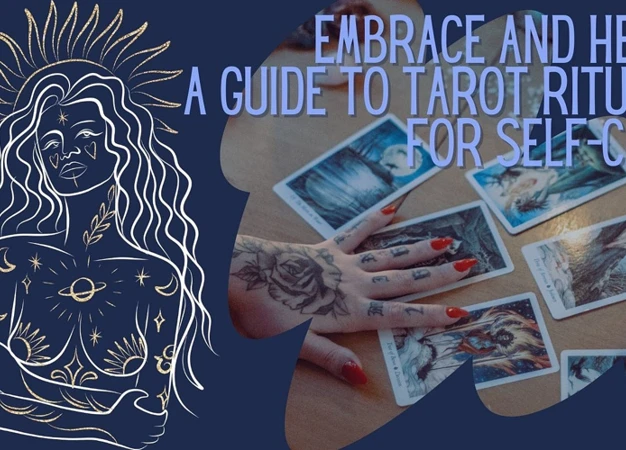Welcome to the world of Tarot for Emotional Balance: Finding Harmony and Inner Peace! In our fast-paced and hectic lives, it’s common to feel overwhelmed and disconnected from our emotions. The ancient art of Tarot offers a unique path to self-discovery, helping us navigate the depths of our emotions and find inner peace. By connecting with our emotions, exploring subconscious patterns, and gaining clarity and insight, Tarot serves as a powerful tool for emotional healing and balance. In this article, we will delve into the role of Tarot in promoting emotional well-being, discuss how to choose the right Tarot deck, explore various techniques for cultivating inner peace, highlight key Tarot cards for emotional balance, and provide Tarot spreads and rituals to aid in achieving harmony and tranquility. So, grab your Tarot deck and get ready to embark on a transformative journey towards emotional equilibrium!
Contents
- The Role of Tarot in Emotional Balance
- Choosing the Right Tarot Deck
- Cultivating Inner Peace through Tarot
- Key Tarot Cards for Emotional Balance
- Achieving Emotional Balance: Tarot Spreads and Rituals
- Conclusion
-
Frequently Asked Questions
- How can Tarot help with emotional balance?
- Which Tarot deck is best for emotional healing?
- Can Tarot predict emotional outcomes?
- How can I use Tarot for self-reflection?
- What role does intuition play in Tarot readings?
- Can Tarot help with managing daily stress?
- What are some rituals that can enhance the Tarot experience?
- How can Tarot be integrated into daily life?
- Are there specific Tarot cards that promote emotional healing?
- Can Tarot replace professional therapy for emotional issues?
- References
The Role of Tarot in Emotional Balance
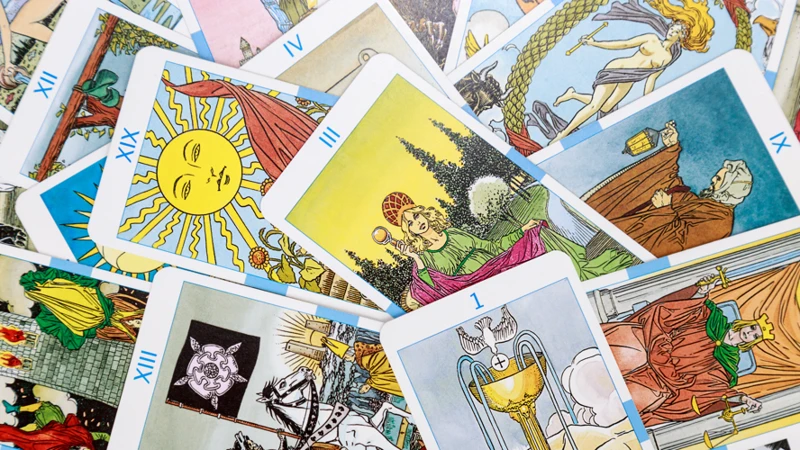
Tarot plays a crucial role in promoting emotional balance, offering a powerful means of finding harmony and inner peace. Through Tarot, we can establish a deep connection with our emotions, gaining valuable insights into our inner workings and fostering self-awareness. By exploring subconscious patterns that influence our emotional state, Tarot helps us uncover hidden beliefs and behaviors that may be holding us back. This self-exploration allows us to address emotional wounds and traumas, facilitating healing and growth. Tarot provides a pathway to clarity and insight, offering guidance and perspective on our emotional challenges and dilemmas. Whether it’s through powerful symbolism and imagery, personal connection to the cards, or intuitive interpretation, Tarot provides a unique and profound tool for addressing emotional imbalances and finding solace within ourselves. Incorporating Tarot into our self-care practices can be a transformative experience, enabling us to navigate the complexities of our emotions and restore inner equilibrium. To learn more about the power of Tarot in healing emotional wounds, check out our article on The Power of Tarot in Healing Emotional Wounds. Additionally, for guidance on incorporating Tarot into your self-care routine, you can explore our article on Incorporating Tarot into Self-Care. So, let’s dive into the extraordinary world of Tarot and embark on a journey of emotional healing and transformation.
Connecting with Your Emotions
When it comes to connecting with your emotions, Tarot can be an invaluable tool. The cards serve as a mirror that reflects our innermost thoughts, feelings, and experiences. To begin, find a quiet and comfortable space where you won’t be disturbed. Place your Tarot deck in front of you and take a few deep breaths to center yourself. As you shuffle the cards, focus your intention on connecting with your emotions and gaining clarity. When you feel ready, draw a card from the deck and observe its imagery and symbolism. Pay attention to any emotions or sensations that arise within you as you examine the card. Are there any specific colors, objects, or figures that resonate with you? This process of observation and reflection allows you to tap into your subconscious and uncover emotions that may have been buried or hidden. Take note of the card’s message and contemplate how it relates to your current emotional state. To deepen your connection with your emotions and explore further healing, consider incorporating Tarot into your daily self-care rituals. Our article on Tarot Healing Rituals provides insights and guidance on how to use Tarot as a transformative practice for emotional well-being. With Tarot as your guide, you can embark on a profound journey of self-discovery and emotional balance.
Exploring Subconscious Patterns
Exploring Subconscious Patterns: When it comes to emotional balance, delving into our subconscious patterns is essential. With Tarot as our guide, we can uncover the hidden beliefs, behaviors, and thought patterns that influence our emotions and well-being. The imagery and symbolism in Tarot cards act as mirrors, reflecting the depths of our subconscious mind. Each card represents different archetypes and themes that resonate with our personal experiences and struggles. By laying out the cards and interpreting their meanings, we gain insight into the subconscious patterns that impact our emotional state. This process allows us to identify self-sabotaging behaviors, limiting beliefs, and unresolved traumas that may be hindering our emotional balance. As we become aware of these patterns, we can consciously work on healing and transforming them. Tarot serves as a powerful tool for bringing these patterns to light, enabling us to address emotional wounds and create positive change. By exploring subconscious patterns through Tarot, we empower ourselves to break free from old patterns, cultivate emotional resilience, and find a greater sense of harmony and inner peace in our lives.
Gaining Clarity and Insight
When it comes to emotional balance, gaining clarity and insight is essential. Tarot serves as a valuable tool for uncovering the underlying causes and patterns behind our emotions, allowing us to gain a deeper understanding of ourselves. Here are some ways in which Tarot helps us gain clarity and insight:
- Symbols and Imagery: The rich symbolism and imagery present in Tarot cards provide a visual representation of our emotional landscape. Each card carries its own unique meaning and message, which can be interpreted to shed light on our current emotional state. Delving into the symbolism of the cards helps us tap into our subconscious mind and gain a fresh perspective on our emotions.
- Intuitive Interpretation: Tarot encourages us to trust our intuition and tap into our inner wisdom. Through intuitive interpretation, we are able to go beyond the surface-level meanings of the cards and uncover deeper truths. By allowing our intuition to guide the reading, we can gain profound insights and understanding of our emotional challenges.
- Reflective Questions: Tarot readings often involve asking reflective questions that prompt self-reflection and introspection. These questions encourage us to explore our thoughts, feelings, and motivations, helping us gain clarity on aspects of our emotional well-being that may have been hidden or overlooked. By asking targeted questions during a reading, we can unlock valuable insights and gain a clearer understanding of ourselves.
- Pattern Recognition: Over time, as we engage in regular Tarot readings, we begin to notice patterns and recurring themes within our emotional experiences. These patterns provide valuable information about our emotional triggers, habits, and responses. Recognizing these patterns allows us to make conscious choices and take proactive steps towards emotional balance.
Through the combination of symbolism, intuition, reflective questioning, and pattern recognition, Tarot provides a holistic approach to gaining clarity and insight into our emotions. By engaging with Tarot cards and practicing regular readings, we can uncover the depths of our emotional landscape and discover powerful insights that guide us towards greater emotional balance and harmony.
Choosing the Right Tarot Deck
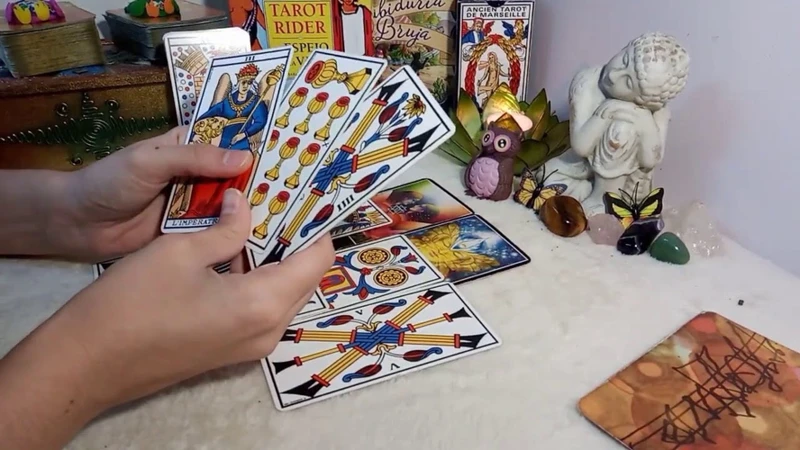
When it comes to choosing the right Tarot deck, there are several important factors to consider. First, pay attention to the symbols and imagery present in the deck. Each Tarot card holds significant meaning, and finding a deck with symbols that resonate with you can enhance your connection to the cards. Consider the artistic style and visual aesthetic as well, as it should speak to your personal preferences and interests. Additionally, trust your intuition when selecting a Tarot deck, as it should evoke a sense of attraction and intrigue. Another crucial aspect is intuitive interpretation, as this allows for a more personal and profound experience with the cards. The deck should offer room for individual interpretation and intuitive insights. To assist you further in choosing the perfect Tarot deck for your journey, check out our comprehensive list of recommended decks, each with its own unique energy and symbolism, in our article on Choosing the Right Tarot Deck. Remember, selecting the right deck is a personal choice that will deepen your connection and enhance your Tarot practice.
Symbols and Imagery
Symbols and imagery are the backbone of Tarot readings, and they play a significant role in fostering emotional balance. Each Tarot card is adorned with intricate symbols and imagery that hold profound meaning and evoke deep emotions. The symbols act as gateways to our subconscious, tapping into the collective unconscious and allowing us to access hidden aspects of ourselves. For example, the Empress card represents nurturing and compassion, often depicted with imagery such as a mother and child or abundant nature. These symbols evoke feelings of warmth, love, and empathy, reminding us to nurture ourselves and others. Similarly, the Moon card symbolizes intuition and emotions, often depicted with a moonlit landscape and a crab emerging from the water. These symbols invite us to explore our deepest emotions and trust our instincts. By engaging with the symbols and imagery of the Tarot, we can unlock profound insights and gain a deeper understanding of our emotional landscape. Each symbol holds personal meaning, and our interpretation of them allows us to connect with our emotions on a profound level. As we study and reflect on the symbols, we begin to grasp their multi-layered meanings and integrate their wisdom into our lives. So, when selecting a Tarot deck, pay attention to the symbols and imagery that resonates with you personally, as they will facilitate a deeper emotional connection and enhance your ability to find harmony and inner peace.
Personal Connection
When it comes to Tarot, developing a personal connection with your deck is paramount for a meaningful and intuitive reading experience. Here are a few ways to strengthen your personal connection:
1. Selecting the Right Deck: Start by choosing a Tarot deck that resonates with you on a deep level. The imagery, artwork, and overall theme should speak to your personal interests and aesthetic preferences. Trust your instincts and choose a deck that sparks joy and curiosity within you.
2. Spending Time with Your Deck: Dedicate time to get to know your Tarot deck intimately. Take it out of the box, shuffle the cards, and spend time examining each card individually. Notice the symbolism, colors, and details. This process allows you to establish a bond with your deck and understand its unique energy.
3. Meditating with Your Deck: Incorporate meditation into your Tarot practice. Set aside quiet time, hold your deck in your hands, and focus on its energy. Visualize a white light surrounding the deck, infusing it with positive energy and intention. This meditation helps create a spiritual link between you and your cards.
4. Conversing with Your Deck: Treat your Tarot deck as a trusted friend and confidant. Have conversations with your deck, either silently or out loud. Ask it questions, seek guidance, and listen for intuitive insights. This dialogue deepens your connection and enhances your ability to tap into the wisdom of the cards.
5. Keeping a Tarot Journal: Record your thoughts, feelings, and interpretations in a Tarot journal. Reflect on the cards you draw and the messages they convey. Over time, patterns and personal meanings will emerge, strengthening your connection and enriching your readings.
Developing a personal connection with your Tarot deck is an ongoing process. It requires patience, openness, and a willingness to explore the depths of your intuition. As you cultivate this connection, you’ll find that your readings become more accurate, insightful, and deeply rooted in your own unique understanding of the cards.
Intuitive Interpretation
Intuitive interpretation is a fundamental aspect of Tarot reading, allowing us to tap into our inner wisdom and intuition. It involves going beyond the traditional meanings of the cards and relying on our personal insights and intuitive guidance to uncover deeper truths and messages. When practicing intuitive interpretation, it’s important to approach the cards with an open mind and trust in our instincts. We may find ourselves drawn to specific symbols or images on the cards, or experiencing strong emotions or intuitive nudges as we connect with the energy of the reading. This intuitive connection enables us to access valuable information that may not be evident from the card’s traditional interpretations. Intuitive interpretation encourages us to trust our inner voice and embrace our unique perspectives and insights. By letting go of rigid interpretations and allowing our intuition to guide us, we can unlock profound revelations and gain a deeper understanding of our emotions and the situations at hand. It’s essential to cultivate a sense of presence and receptivity when engaging in intuitive interpretation, allowing the messages to flow naturally and without judgment. This intuitive approach adds a personal touch to Tarot readings, creating a space for profound self-reflection and emotional healing. It is through intuitive interpretation that Tarot becomes a powerful tool for finding emotional balance and inner peace.
Cultivating Inner Peace through Tarot
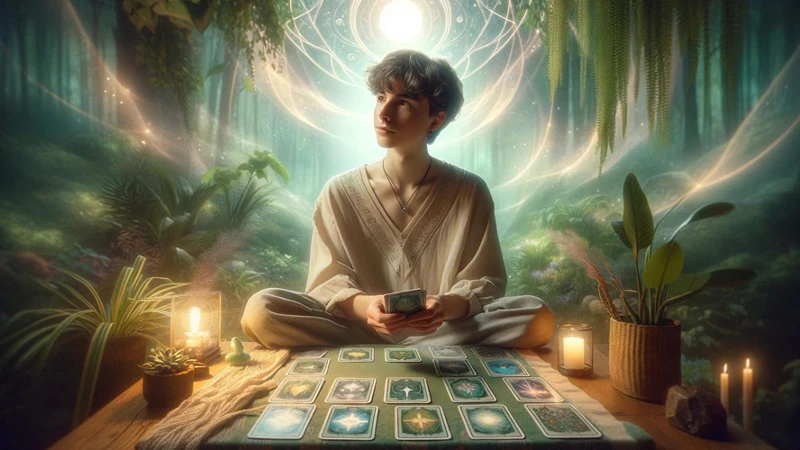
Cultivating inner peace is essential for our overall well-being, and Tarot can be a powerful tool in this journey. By incorporating mindfulness and meditation practices into our Tarot sessions, we can cultivate a sense of calm and tranquility. Taking a few moments of stillness before starting a reading allows us to center ourselves and open up to the wisdom of the cards. Journaling and self-reflection are also valuable practices that enable us to deepen our understanding of our emotions and thoughts. By keeping a Tarot journal, we can record our card interpretations, reflect on our experiences, and track our emotional growth over time. Additionally, integrating Tarot into our daily practices can help us maintain a sense of inner peace throughout the day. This could include drawing a daily card in the morning for guidance or incorporating Tarot affirmations or visualizations into our routines. By finding creative and personalized ways to incorporate Tarot into our lives, we can harness its transformative power to cultivate inner peace. So, grab your Tarot deck, find a quiet space, and embark on a journey of self-discovery and serenity with Tarot as your guide.
Mindfulness and Meditation
Mindfulness and meditation are essential practices for cultivating inner peace and emotional balance through Tarot. Incorporating mindfulness into your Tarot readings allows you to be fully present in the moment, fostering a deep connection with the cards and your own emotions. Begin by creating a calm and sacred space for your Tarot practice, free from distractions. Take a few deep breaths to center yourself and bring your focus to the present moment. As you shuffle the cards, pay attention to the physical sensations and the sound of the cards. Allow yourself to become fully immersed in the experience. When you draw a card, take a moment to observe its imagery and symbolism. Notice any sensations or emotions that arise within you. Mindfully explore the card’s message and how it relates to your current emotional state. Meditation is another powerful practice that can enhance your Tarot journey. After a reading, find a comfortable position and close your eyes. Take a few moments to reflect on the cards and the insights they have provided. Allow yourself to dive deeper into your emotions and thoughts. You can also use specific meditative techniques, such as visualizations or breathwork, to further explore and release any emotional blockages. Regularly incorporating mindfulness and meditation into your Tarot practice will deepen your connection with your emotions, promote self-awareness, and ultimately lead to greater emotional balance and inner peace.
Journaling and Self-Reflection
Tarot is a powerful tool for self-reflection, and incorporating journaling into your tarot practice can deepen your exploration of emotions and promote inner peace. Journaling allows you to document and reflect on your tarot readings, providing a valuable record of your thoughts, insights, and personal growth. Start by setting aside dedicated time for journaling after each tarot reading. Begin by writing down the cards you drew and their meanings. Then, use your journal as a space to explore your emotional reactions and associations to each card. Reflect on how these emotions relate to your current life circumstances and experiences. Allow yourself to freely express your thoughts, fears, hopes, and desires.
Additionally, journaling can be used as a tool for self-reflection outside of your tarot practice. Set aside time each day to journal about your emotions, experiences, and any insights gained from your tarot readings. Write about any emotional imbalances or areas of your life where you seek more harmony and inner peace. Journaling cultivates self-awareness and helps you gain a deeper understanding of your emotions, facilitating personal growth.
Incorporate creative techniques into your journaling practice, such as free-writing, drawing, or collaging. These techniques can further unlock your intuition and allow for a more holistic exploration of your emotions. Use your journal as a safe space to express yourself without judgment, allowing your authentic emotions to flow onto the pages.
To enhance the effectiveness of your journaling practice, consider using tarot spreads specifically designed for self-reflection and inner peace. These spreads can provide guidance and structure to your journaling sessions by offering prompts for exploration. For example, a spread may ask you to reflect on the emotions you are currently experiencing, how they manifest in your life, and what steps you can take to find balance and inner peace. By combining tarot readings with thoughtful journaling, you can uncover hidden insights, patterns, and potential solutions to emotional imbalances.
Remember, journaling is a personal practice, so tailor it to your own preferences and needs. There is no right or wrong way to journal – it is simply a means of connecting with your emotions, fostering self-reflection, and promoting inner peace. So, grab your favorite journal and pen, and embark on a transformative journey of self-discovery and emotional balance through tarot journaling.
Integrating Tarot in Daily Practices
Integrating Tarot in daily practices is a powerful way to foster emotional balance and cultivate inner peace. By incorporating Tarot into our daily routines, we establish a consistent connection with our emotions and gain valuable insights on a regular basis. One practical way to integrate Tarot into our daily practices is by pulling a daily card. Each morning, take a moment to shuffle your Tarot deck and draw a card that will serve as a guiding theme for the day. Reflect on the card’s symbolism, meaning, and how it relates to your current emotional state. This practice allows you to set intentions and stay mindful of your emotions throughout the day. Another effective way to infuse Tarot into daily life is by keeping a Tarot journal. After each Tarot reading, take some time to write down your thoughts, feelings, and interpretations of the cards. This journal becomes a valuable resource for self-reflection and helps you track patterns, uncover insights, and monitor your emotional progress over time. Additionally, consider creating a sacred space for your Tarot practice. Set aside a dedicated area in your home where you can perform Tarot readings, meditate, and engage in self-care rituals. This space can be adorned with crystals, candles, and other meaningful objects that resonate with your emotional well-being. By integrating Tarot into your daily practices, you create a consistent and profound connection with your emotions, promoting emotional balance and inner peace. Let Tarot become a cherished part of your daily routine, allowing it to guide you on your journey towards emotional well-being.
Key Tarot Cards for Emotional Balance
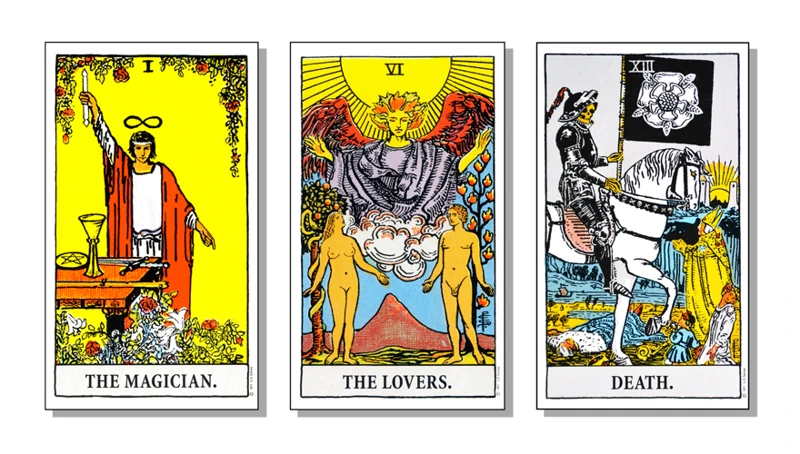
When it comes to Tarot for emotional balance, certain cards hold significant importance in guiding us towards harmony and inner peace. The Empress represents nurturing and compassion, reminding us to care for ourselves and others with kindness and understanding. This card encourages us to embrace our emotions and tap into our nurturing qualities. The Temperance card embodies balance and moderation, teaching us the importance of finding equilibrium in our thoughts, feelings, and actions. It urges us to find harmony between different aspects of our lives and work towards a balanced state of being. The Star card symbolizes hope and healing, reminding us that even in the darkest moments, there is always a glimmer of light and the possibility of renewal. It encourages us to hold onto hope and trust in the process of healing. Lastly, the Moon card represents intuition and emotions, guiding us to listen to our inner voice and honor our feelings. It reminds us that sometimes the answers we seek lie within the depths of our own subconscious. By understanding and embracing the messages of these key Tarot cards, we can navigate the intricate landscape of our emotions and forge a path towards emotional balance.
The Empress: Nurturing and Compassion
The Empress card in Tarot represents the embodiment of nurturing and compassion. As one of the major arcana cards, the Empress symbolizes the feminine energy of abundance, fertility, and unconditional love. When this card appears in a reading, it serves as a reminder to tap into our nurturing instincts and show compassion to ourselves and others. The Empress encourages us to create a harmonious environment that supports growth and emotional well-being. She reminds us to care for ourselves by prioritizing self-care and self-love. This card highlights the importance of connecting with nature, as it represents the bountiful gifts of the earth. Embracing the energy of the Empress allows us to cultivate a nurturing presence in our relationships, whether it be with family, friends, or even in our own self-talk. Practice acts of kindness and show empathy towards others. The Empress card reminds us to trust in the natural cycles of life and embrace the transformative power of birth, growth, and renewal. When facing emotional challenges, call upon the nurturing energy of the Empress to provide comfort and solace, like a warm embrace from a loving mother. The Empress embodies the qualities of nurturing and compassion, urging us to find balance and create a space of love and abundance in our lives.
The Temperance: Balance and Moderation
The Temperance card in Tarot represents the essence of balance and moderation. When this card appears in a reading, it serves as a reminder to find equilibrium in all aspects of life. The Temperance card encourages us to bring harmony between our emotions, thoughts, and actions. It signifies the importance of finding a middle ground, avoiding extremes, and embracing a more measured approach to life. This card teaches us the value of patience and self-control, urging us to temper our impulses and find a sense of inner calm. The imagery on the Temperance card often depicts an angelic figure pouring water between two cups, symbolizing the blending and balancing of opposing forces. This card suggests that by embracing both our light and shadow sides, we can experience a greater sense of harmony and peace. The Temperance card also signifies the need for adaptability and flexibility in the face of challenges. It reminds us to remain open-minded and willing to compromise, for it is through finding common ground that we can achieve a state of balanced tranquility. The Temperance card serves as a gentle reminder that balance and moderation are the keys to emotional well-being and inner peace.
The Star: Hope and Healing
The Star card in Tarot represents hope, healing, and spiritual renewal. It is a symbol of light in the darkness, reminding us that there is always a glimmer of hope even in the most challenging times. When this card appears in a reading, it signifies a period of optimism and inspiration. It encourages us to believe in ourselves and have faith in the universe’s greater plan.
In terms of emotional balance, The Star card reminds us to let go of past pain and forge ahead with a renewed sense of purpose. It signals a time of healing and finding inner peace. The card’s gentle and calming energy invites us to connect with our intuition and trust in our own inner guidance.
The Star card often depicts a woman pouring water into a pond and stars shining brightly in the sky. This imagery represents the flow of emotions and the connection between the earthly and the divine. It signifies that by allowing our emotions to flow freely, we can experience true healing and find harmony within ourselves.
When working with The Star card, it can be helpful to meditate on its imagery and contemplate its message. Visualize yourself surrounded by the healing light of the stars, and imagine any emotional wounds being soothed and transformed. Journaling about your experiences and feelings while meditating on The Star card can also provide valuable insights and aid in your healing journey.
The Star card in Tarot brings a message of hope, healing, and renewal. Its energy supports emotional balance and encourages us to let go of past pain while embracing a brighter future. By connecting with The Star’s symbolism and allowing its healing energy to flow through us, we can find peace and serenity within ourselves.
The Moon: Intuition and Emotions
The Moon card in Tarot is a potent symbol of intuition and emotions. Represented by a serene moon shining brightly in the night sky, this card invites us to explore the depths of our subconscious and connect with our innermost feelings. The Moon signifies a time of heightened sensitivity, where our intuition becomes a guiding force in understanding our emotions. It urges us to trust our instincts and delve into the realms of our unconscious mind. The Moon card reminds us that emotions can be complex and multifaceted, often hidden beneath the surface. It encourages us to embrace our emotions and allows them to flow freely, acknowledging that they hold valuable wisdom and insights. In a Tarot reading, the appearance of The Moon card suggests the need for self-reflection and introspection. It invites us to confront our fears and anxieties, bringing them to light for healing and transformation. The Moon teaches us to embrace the ebb and flow of emotions, just as the moon waxes and wanes. It encourages us to explore our dreams, symbols, and subconscious messages to gain a deeper understanding of ourselves. The Moon card serves as a gentle reminder that our emotions, like the moon, undergo cycles of change and growth. By embracing our intuition and nurturing our emotional well-being, we can find balance and harmony within ourselves.
Achieving Emotional Balance: Tarot Spreads and Rituals
In the pursuit of emotional balance, Tarot spreads and rituals serve as valuable tools for self-reflection, healing, and transformation. Tarot spreads offer specific layouts that guide us in exploring different aspects of our emotions, providing clarity and guidance along the way. One powerful spread for achieving emotional equilibrium is the Balance Spread, which helps us identify areas of imbalance and find ways to restore harmony within ourselves. By examining the energies present in our emotions, Tarot spreads facilitate a deeper understanding of our emotional landscape and offer insights into the steps we can take to achieve balance. Alongside spreads, Tarot rituals provide a sacred space for us to connect with our emotions and cultivate inner peace. The Harmony Ritual, for example, enables us to create a serene atmosphere as we meditate with specific cards, allowing their energies to infuse our being. These rituals can be performed regularly as part of our self-care routines, helping us integrate Tarot into our daily lives and maintain emotional well-being. To explore more Tarot spreads and rituals for achieving emotional balance, be sure to visit our comprehensive guide on Tarot Healing Rituals. Embark on your journey toward emotional balance today, and let the wisdom of Tarot be your guiding light.
The Balance Spread
The Balance Spread is a powerful Tarot spread designed to help you gain insight into areas of your life that may be out of balance and find ways to restore harmony. This spread consists of six cards, each representing a different aspect of your life. Here’s how to perform the Balance Spread:
1. Card 1: Foundation – This card represents the foundation of your life, the core aspects that provide stability and support. It gives you insight into what areas are strong and balanced.
2. Card 2: Relationships – This card focuses on your relationships, both romantic and platonic. It reveals any imbalances or conflicts that may be affecting your connections with others.
3. Card 3: Work/Career – This card sheds light on your work or career path. It helps you understand if you are finding fulfillment in your professional life or if changes need to be made.
4. Card 4: Finances – This card relates to your financial situation. It highlights any areas of abundance or scarcity, allowing you to address any imbalances and work towards financial stability.
5. Card 5: Health and Well-being – This card addresses your physical and emotional well-being. It indicates areas where self-care and nurturing may be needed to restore balance.
6. Card 6: Spirituality – This final card relates to your spiritual journey and connection to something greater than yourself. It helps you understand if your spiritual life is in alignment or if adjustments are needed.
To perform the Balance Spread, shuffle your deck while focusing on the areas of your life you wish to explore. Lay the cards out in the order described above, one by one, and interpret each card’s meaning in relation to its corresponding aspect of life. Pay attention to any patterns, symbols, or intuitive insights that arise during the reading.
The Balance Spread is a valuable tool for gaining clarity and insight into the different dimensions of your life and identifying areas where adjustments can be made to achieve greater harmony. Use this spread regularly to check in with yourself and make conscious choices that promote balance and well-being. Remember, Tarot is a guidance tool, and the ultimate power lies within you to create the balance you seek.
The Harmony Ritual
The Harmony Ritual is a powerful practice that utilizes the energy of Tarot to promote emotional balance and inner peace. This ritual can help you align your thoughts, emotions, and actions, creating a sense of harmony within yourself and with the world around you.
To perform the Harmony Ritual, you will need your Tarot deck and a quiet space where you can focus without distractions. Follow these steps to engage in this transformative practice:
1. Set the Intention: Begin by setting your intention for the ritual. Reflect on what you hope to achieve—whether it’s finding balance, releasing negativity, or cultivating peace. Take a moment to ground yourself and center your energy.
2. Shuffle the Deck: With your intention in mind, shuffle your Tarot deck while focusing on the energy you wish to cultivate. As you shuffle, visualize any emotional imbalances dissipating, leaving you with a sense of calm and harmony.
3. Select a Card: Once you feel ready, select a card intuitively from the deck. This card will serve as a guiding force for your ritual. Pay attention to the imagery and symbolism on the card, as it may provide insights and messages related to your emotional balance.
4. Contemplate and Meditate: Take a moment to study the card you selected. Reflect on its meaning and how it relates to your emotional well-being. Close your eyes and enter a state of meditation, allowing the energy of the card to fill your being. Visualize yourself embodying the qualities represented by the card, such as peace, balance, or harmony.
5. Affirmations and Intentions: Create personal affirmations or intentions that resonate with the energy of the card. These can be positive statements that affirm your emotional balance and inner peace. Repeat these affirmations aloud or silently, infusing them with conviction and belief.
6. Integration: Slowly transition out of your meditation and bring your awareness back to the present moment. Take a deep breath and express gratitude for the insights and energy you have received. Carry the energy of the Harmony Ritual with you as you go about your day, striving to maintain emotional balance and inner peace in all your interactions and experiences.
Remember, the Harmony Ritual is a personal practice, and you can adapt it to suit your needs and preferences. Repeat this ritual regularly to reinforce your emotional well-being and cultivate an enduring sense of peace and harmony within yourself.
By incorporating the Harmony Ritual into your Tarot practice, you can harness the transformative power of Tarot to bring emotional balance and create a harmonious inner landscape.
The Inner Peace Meditation
Finding inner peace is a fundamental aspect of emotional balance, and the Tarot can be a powerful tool to support this journey. The Inner Peace Meditation incorporates Tarot cards to guide you in cultivating a sense of tranquility and harmony within yourself.
To begin the Inner Peace Meditation, start by creating a calm and quiet space where you can focus without distractions. Sit in a comfortable position and take a few deep breaths to center yourself. Shuffle your Tarot deck while holding the intention of seeking inner peace. When you feel ready, draw a card from the deck and place it face up in front of you.
Observe the card’s imagery and symbolism, allowing yourself to fully connect with its energy. Reflect on how this card represents aspects of inner peace, such as serenity, balance, or harmony. Let the card’s message resonate with you, and contemplate how it can guide you towards finding inner tranquility.
Next, close your eyes and visualize yourself embodying the qualities represented by the card. Imagine a gentle light surrounding you, bringing a sense of calm and peace into your being. Take a few moments to immerse yourself in this visualization, allowing any tension or stress to melt away.
As you continue the meditation, you can choose to draw additional cards to explore different aspects of inner peace, such as self-acceptance, forgiveness, or gratitude. Each card can provide insights and guidance on your journey towards emotional balance.
After spending a few minutes in deep reflection, slowly open your eyes and take a final deep breath. Express gratitude for the guidance and wisdom received from the Tarot cards. Take a moment to journal your thoughts and feelings, capturing any insights or revelations that arose during the meditation.
You can incorporate the Inner Peace Meditation into your regular self-care routine, allowing it to become a sacred practice for finding inner harmony. By regularly connecting with the Tarot and utilizing its guidance in meditation, you can deepen your understanding of yourself and cultivate a lasting sense of peace.
Remember, the Inner Peace Meditation is a personal and intuitive practice. Trust your instincts and allow the Tarot to be a supportive ally on your journey to emotional balance and inner tranquility.
Conclusion
In conclusion, Tarot is a remarkable tool for achieving emotional balance, harmony, and inner peace. Throughout this article, we have explored the profound role that Tarot plays in promoting emotional well-being. It allows us to connect with our emotions on a deeper level, uncover subconscious patterns, and gain clarity and insight. Choosing the right Tarot deck is essential, as symbols and imagery hold great significance in the interpretation of the cards. Developing a personal connection with our Tarot deck enhances the effectiveness of readings, as intuition plays a vital role in understanding the messages conveyed. Cultivating inner peace through Tarot involves mindfulness, meditation, journaling, and integrating Tarot into our daily practices. The Empress, Temperance, Star, and Moon are powerful Tarot cards that symbolize nurturing, compassion, balance, hope, healing, intuition, and emotions, all of which contribute to emotional equilibrium. Tarot spreads such as the Balance Spread provide guidance in addressing imbalances, while rituals like the Harmony Ritual and Inner Peace Meditation enhance the transformative nature of Tarot. By utilizing these tools and techniques, we can harness the power of Tarot to navigate our emotional landscape and find harmony within ourselves. Remember, Tarot is not just a divination tool but a pathway to self-discovery and healing. So, embrace the wisdom of the cards, trust your intuition, and embark on a journey of emotional growth and balance with Tarot as your guide.
Frequently Asked Questions
How can Tarot help with emotional balance?
Tarot can help with emotional balance by providing insight into your emotions, allowing you to explore subconscious patterns, and gaining clarity on your emotional challenges. It serves as a powerful tool for self-reflection, healing, and finding inner peace.
Which Tarot deck is best for emotional healing?
Choosing a Tarot deck is a personal preference. However, decks that have rich symbolism and imagery can be particularly powerful for emotional healing. Look for decks that resonate with you on an intuitive level and evoke the emotions you wish to address.
Can Tarot predict emotional outcomes?
Tarot is not meant to predict specific outcomes, but rather to offer guidance and insight into emotions and situations. It helps you gain a deeper understanding of your emotions, giving you the tools to make informed choices and navigate emotional challenges more effectively.
How can I use Tarot for self-reflection?
You can use Tarot for self-reflection by drawing cards and asking questions that prompt deep introspection. Take time to analyze the symbolism and meaning behind each card, allowing the messages to resonate with your own emotions and experiences.
What role does intuition play in Tarot readings?
Intuition plays a significant role in Tarot readings. It allows you to connect with the cards on a deeper level and interpret their messages based on your own inner wisdom. Trusting your intuition can provide valuable insights and guidance.
Can Tarot help with managing daily stress?
Absolutely! Tarot can be a helpful tool for managing daily stress by providing you with a fresh perspective and guiding you towards a calmer state of mind. Drawing cards and reflecting on their messages can offer clarity and support when dealing with stress.
What are some rituals that can enhance the Tarot experience?
There are various rituals you can incorporate into your Tarot practice, such as grounding exercises, setting intentions before a reading, or creating a sacred space. These rituals help create a sense of focus and connection, enhancing the overall experience.
How can Tarot be integrated into daily life?
Tarot can be integrated into daily life by incorporating it into mindfulness and meditation practices, journaling about your Tarot readings, and using Tarot as a tool for self-reflection and personal growth. By making Tarot a part of your daily routine, you can nurture emotional balance and inner peace.
Are there specific Tarot cards that promote emotional healing?
Yes, certain Tarot cards are commonly associated with emotional healing. The Empress represents nurturing and compassion, The Temperance embodies balance and moderation, The Star symbolizes hope and healing, and The Moon represents intuition and emotions.
Can Tarot replace professional therapy for emotional issues?
Tarot can be a valuable complementary tool to therapy, but it is not a substitute for professional help. If you are experiencing severe emotional issues, it is important to consult with a qualified therapist or counselor who can provide the appropriate guidance and support.
